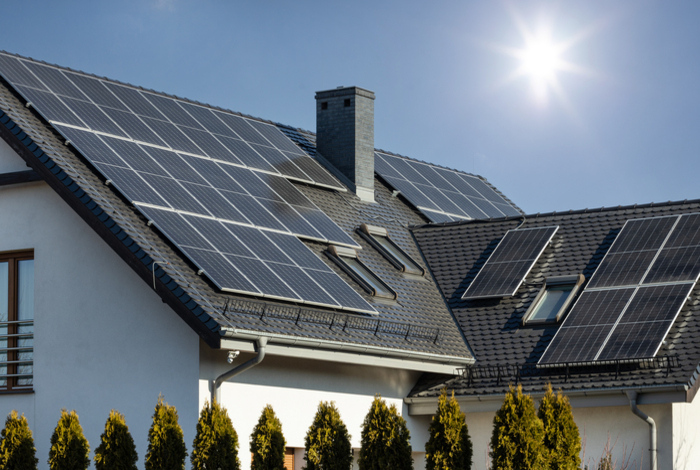‘Green home bonus’ on offer for households that install clean technologies
A new report from energy provider OVO has found that the installation of clean technologies, including solar panels and heat pumps, could provide households with a ‘green home bonus’[i].
The research, which was peer-reviewed by academics from the University of Exeter, the University of Leeds and the University of Stirling, found that investing in cleantech today could save each household almost £13,000 ($17,628) by 2035, and over £23,000 ($31,188) by 2040, compared to those who stay on oil or gas. These financial benefits exist despite the initial upfront costs to buy and install new systems, with consumers on track to break even in 2030.
The study finds that homeowners who can install cleantech now will save money in multiple ways, including cash savings and increased value of their homes. It suggests that whilst customers would need an outlay of £15,470 ($20,977) to cover the green technologies considered in the research (including a heat pump, solar panels, an EV, and improved insulation) the savings after a 10-year period would be significant.
Failure to implement these technologies has broader consequences. OVO argues that delayed action to decarbonise the UK’s homes could cost the economy billions and leave households tens of thousands of pounds worse off. Yet they claim that reaching Net Zero will cost around 0.2% of GDP each year – far less than what’s currently committed to the NHS (National Health Service), with much of this investment expected to come from the private sector.
David Buttress, OVO CEO said: “We’ve stumbled into a false debate. Net zero is framed as expensive and unrealistic – but the data is clear: not decarbonising will cost households and the country far more. We talk endlessly about the cost of action and investing in net-zero – but the real crisis is the cost of inaction, and the investment that our energy system would require even without net zero upgrades.”[ii]
Households want to decarbonise but ‘huge hurdles remain’
OVO’s study finds that the majority of UK households (8 in 10) want to decarbonise their property, but huge hurdles remain to facilitate widespread change. Concerningly, for more than 70% of households, the high upfront costs make the change impossible, and almost all low-income households (92%) report that green home technologies feel “out of reach”. Alongside this, 3 in 5 households (59%) are unaware that technologies such as heat pumps could reduce their energy bills over time.
Commenting on the OVO study, Dr Maximilian Gerrath from the University of Leeds, said: “Consumers aren’t just making economic decisions. They’re navigating a maze of fear, complexity, and inertia. To accelerate decarbonisation, we must make green homes not just affordable, but easy, visible, and aspirational. Most people don’t resist green upgrades because they dislike them – they resist because the benefits feel distant, while the costs are immediate.”[iii]
OVO argue that more detail and support is needed to help consumers make changes. They suggest:
- Boosting means-tested upfront cash incentives, introducing low or no interest loans for green home upgrades;
- Removing policy costs which needlessly increase electricity bills;
- Introducing a social tariff to shield lower-income households from gas price volatility, to ensure it is not only homeowners who benefit from lower bills.
E.ON Next launches ‘Next Gen Home’ to provide low carbon tech without the upfront cost
As the OVO study notes, the upfront costs of cleantech can be substantial, and in many cases prove a significant barrier for wider adoption.
To address this, providers are looking at other ways to help support adoption of cleantech in the home. As we covered in a previous insight, E.ON Next recently announced a new pilot scheme in the UK to help lower the cost-barrier of low carbon technologies.
The company plans to offer customers ‘a modular, all-inclusive energy package’ which includes solar panels, batteries, heat pumps, EV chargers, servicing, and energy. Initially, the pilot will be made available to 20 E.ON Next customers in the Midlands, but if successful, E.ON plans to expand the offering nationwide by early 2026. Those participating in the pilot will receive roughly £20,000 worth of energy saving equipment, alongside a home energy management app, and customers will not be required to pay a lump sum up front.
Announcing the scheme Ramona Vlasiu, Chief Operating Officer at E.ON Next, said: “We believe that greener energy choices should be available to everyone, not just the affluent. If we can remove the burden of large upfront costs, there is greater potential to help lower customers’ carbon emissions and bills, and help more people to invest in their own homes in the long term”[iv]
E.ON Next hopes that by removing the upfront cost and coupling this with state-of-the-art digital technology to optimise energy use, energy-efficient properties can be made a reality for more people.
References
[i] The-Green-Home-Bonus-23-July-2025.pdf
[ii] Ibid
[iii] Ibid
[iv] E.ON Next launches ‘Next Gen Home’ to provide low carbon tech with no upfront cost | E.ON News






